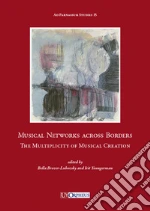 Libri di Brover-Lubovsky B. (cur.); Youngerman I. (cur.) su Unilibro.it) Libri di Brover-Lubovsky B. (cur.); Youngerman I. (cur.) su Unilibro.it)
|
|
2025 |
 Title :
Musical Networks across Borders. The Multiplicity of Musical Creation
Title :
Musical Networks across Borders. The Multiplicity of Musical CreationAuthor: Brover-Lubovsky B. (cur.); Youngerman I. (cur.) Publisher: Ut Orpheus Musical creativity emerges from a multitude of cultural, social and historical intersections. This collection of essays aims to highlight the fluidity of genre, style and compositional technique by expanding musical networks to encompass different forms of mobility, including movement across cultural and geographical spaces and the shifts between centre and periphery. Drawing on a variety of sources, including archival materials and fieldwork, the essays in this collection explore aspects of music-making through diverse cases, ranging from early eighteenth-century instrumental music to opera during the 'long' nineteenth century and to the modern developments of Jewish and Israeli music. In shifting the focus from the centre to the intricate networks that foster musical creativity, individuals and works that have faded from both historiography and concert performance come into view. Thus, so-called 'minor composers' is one of the themes that serve as a common thread running through several essays. Other essays observe style and genre through uncommon yet illuminating lenses, revealing, for example, echoes of opera in Mahler's symphonies, or tracing the influence of Historically Informed Performance on popular video clips. Further intersections arise from placing composers in broader social, political and cultural perspectives, and in following the movement of musicians who transgressed social, cultural and geographical borders. Subsequently, paths are drawn, for example, from the virtually unknown composer-instrumentalists of early eighteenth-century London to the Russian-Je € 93,00
|